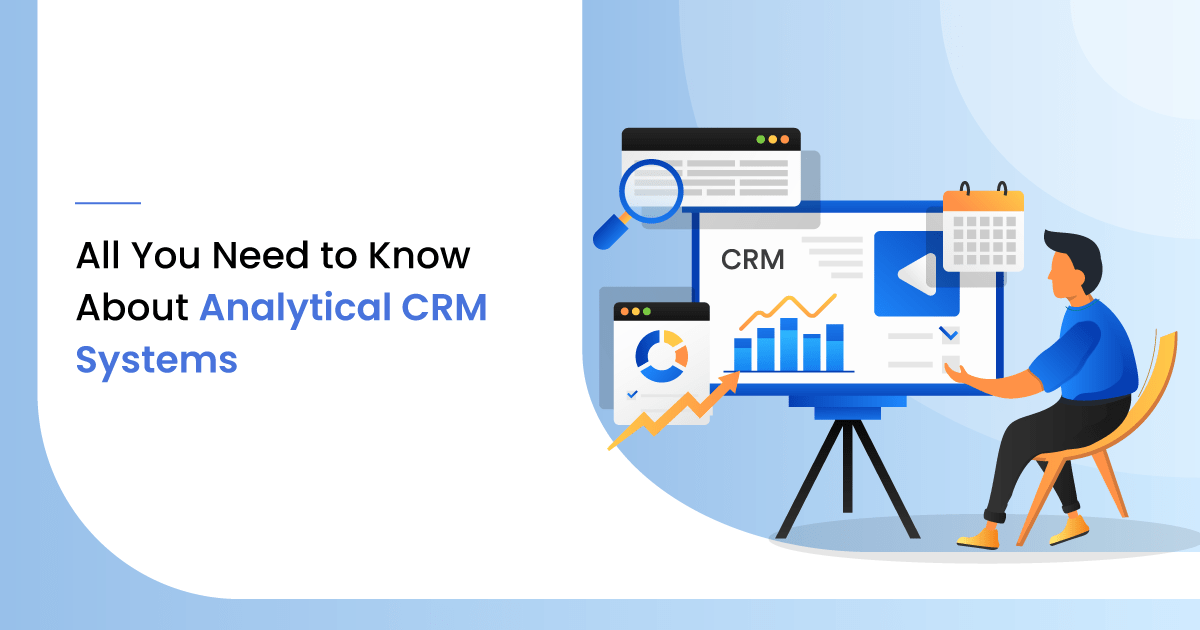An analytical CRM provides top-notch services and increases customer satisfaction that helps companies make profits and gain a competitive edge. Moreover, the technology has become affordable, making it possible for bootstrapped businesses to acquire CRM software.
With several service providers in the market, customers look for the best solutions at affordable prices. Without a well-equipped analytical CRM system, it is difficult to stay ahead of competitors. 91% of businesses with 10 or more employees are using CRM systems to improve alignment between teams and form better customer relationships.
Let us analyze the different aspects of analytical CRM systems and why they’re a must for organizations-
Understanding Analytical CRM
Analytical CRM collects data about customer interactions and analyzes it to improve internal and external operations. It operates at the back-end and is responsible for secure data storage of data. The customer data is fed in the CRM and the information is processed to deliver necessary insights.
Analytical CRM systems can help in massive cost-cutting, increasing and improving customer services, and increase profitability by huge margins. The in-built tools also help discover and execute new marketing campaigns that help businesses gain a competitive advantage.
The data from different channels like live chat, phone calls, and face-to-face conversations are stored in one place that helps provide visibility on customer preferences. This helps organizations segregate customers and plan their marketing and sales strategies.

Looking for Analytical CRM Software? Check out SoftwareSuggest’s list of the best CRM Software solutions.
Analytical CRM works in sync with operational and collaborative CRM tools to improve business processes. Operational CRM and Collaborative CRM help generate leads and facilitate communication between team members respectively. These CRM systems can benefit from advanced data sorting and processing tools provided by analytical CRM. This can help track and share customer data and generate reports. Thus, ensuring synchronization among various domains and teams of an organization.
Functions of Analytical CRM
Let us try and understand in detail that what an analytical CRM does and how is it relevant –
1. Predicting Trends
An analytical CRM analyzes past sales metrics and current trends that help in sales forecasting. Algorithms, machine learning, and business intelligence (BI) help organizations get refined data which provides the best results with the least manual effort.
2. Understanding the Customer Life Cycle
Data can be analyzed from multiple channels and can be used to understand the customer’s life cycle. The analysis can further help organizations build customer profiles and understand their preferences. With an in-depth understanding of consumer behavior, businesses can look forward to reaping profits.
3. Segregating Consumer Data
The CRM analytics software can track leads cross-channel and separate them into individual customer profiles. With lead scoring, organizations can achieve the desired customer metrics and rank them. Super-specific metrics help rank customers at different levels. This helps in planning and executing targeted marketing campaigns.
4. Predict Consumer Behavior
Predictive modeling for marketing can help companies anticipate customer behavior. This lets organizations get a clear cut idea of what works best for marketing. Monitoring sales also provides insights on how to refine the sales process further.
5. Secure Storage of Data
Analytical CRM systems securely store data in one place and make it available for analytical purposes. Feedback forms, information from call centers, billing/invoices, website, and other databases can be accessed quickly to come up with a complete picture.
6. Allows Online Analytical Processing
Online analytical processing (OLAP) lets organizations collate different datasets in one place. A user can “roll-up” to get a bigger picture and narrow down to get detailed information on a particular aspect. They can also separate sections of data to get a comparative analysis.
Benefits of Analytical CRM Systems
Here are a few benefits of analytical CRM systems-
1. Better Customer Experience
With analytical CRM systems organizations can get a whole picture of the customer life cycle. By building customer profiles and understanding their preferences, companies can get potential leads and then convert them to customers. The tools allow for better customer experience and address their needs more effectively. Further, research suggests that using CRM software can increase sales conversion rates by up to 300%. A thorough understanding of customers leads to increased customer loyalty and allows businesses to scale.
2. Result-Oriented Market Campaigns
CRM systems work on pattern recognition that helps in strategic planning. The information obtained can be used for efficient delegation of tasks and to direct resources. Efficient and market-research based campaigns will then lead to better results and more customers. Businesses leveraging CRM analytics software see sales increase by 29%.
3. Optimum Resource Usage
Analytical CRM systems help rationalize marketing efforts and reduce time, money, and human efforts. This helps organizations run targeted campaigns with minimal resource usage. Moreover, it helps businesses avoid outdated methods of marketing.
4. Real-Time Decision Making
Analytical CRM helps ensure data flexibility and usability for real-time decision making. With diverse datasets under a single platform, quick decisions can be made by comparing insights. By using CRM tools sales representatives can shorten their sales cycles by 8 to 14%. Quick decision making gives companies a competitive advantage and allows room for other initiatives.
Operational CRM Vs Analytical CRM
Analytical CRM and Operational CRM are software categories that serve different functions. Let us examine the differences between them-
| CRM System | Analytical CRM | Operational CRM |
| Requirement | Analytical CRM systems are used by data analysts, business intelligence professionals, and accountants. | Suited for people working in marketing operations, customer service, and sales teams. |
| Function | Stores and analyzes information about the entire company. | Help maintain healthy customer relations by maintaining customer records, managing email campaigns, and supporting customer retention. |
The two categories of software work best when paired together. Many vendors design platforms that incorporate analytical tools within a broader operational CRM framework. The different types of CRM systems help bridge the gap between consumers and businesses.
How to Begin with Analytical CRM?
A free trial is the best option before signing up for a paid version of CRM analytics software. Meanwhile, buyers can test the tools offered and how they may support their business. While an analytical CRM requires learning, it is not that hard to use. With time and practice, professionals can effectively use the software.
Many vendors offer quality tutorials and live support to help you quickly get familiar with the software. If you are an organization small or large yet to tap on the benefits of analytical CRM, it is an ideal time to invest in one and see your business grow!
The Analytical Aspects of CRM
CRM systems analyze the different business processes for better understanding and profitability. Let us understand the analytical aspects of CRM-
Customer Analysis
Customer analytics is capable of generating reports on consumer behavior. These reports help organizations understand their customer base thoroughly by generating profiles. Analytical CRM identifies the specific customer segment and offers the best business solutions. It can also inform you about future product and service offerings.
Sales Analysis
Sales analytics help get an exhaustive picture of an organization’s overall sales processes. The information generated is vital to understand the sales cycle and rework the strategy. This helps in predicting future sales volumes and profits. Moreover, it can also help in shifting organizational priorities and assigning sales representatives.
Market Analysis
Marketing analytics is a great way to plan, manage, and scale up your marketing campaigns. The tools will give you a fair idea of resource allocation for campaigns and insights on how to market your product. It can also provide information about new marketing opportunities.
Service Analysis
Service analytics help assimilate information from pools, surveys, and customer sentiment analysis to provide insights on customer value and satisfaction. This helps organizations work on customer services and directing resources to the right place. Further, users can break down service costs and also achieve a balance between costs and revenue earned.
Channel Analysis
Channel analysis gives a picture of how the organization is performing across different channels like social media, live chat, e-mail, and voice. Having cross-channel information helps figure out customer preferences and improve public communication.
A Look At Best Analytical CRM Systems
With a huge list of analytical CRM systems to choose from, it gets difficult to choose the right one. Here is a list of the best analytical CRM systems.
1. Infor CRM (Formerly Saleslogix)
Built on a robust platform, Infor CRM is a CRM solution designed to enable marketing teams to increase the value of business relationships. The CRM is comprised of many tools which include-
- Sales Module supports in managing customer relations and reporting the sales process
- Marketing Tools help track multi-channel marketing campaigns. Executing hyper-targeted campaigns and timely initiatives help in building long-lasting customer relationships
- Customer Service Module effectively tracks and resolves customer support issues. The module allows advanced issue tracking and resolution tools to provide an efficient and responsive service

Pricing
$65 per month.
Free Trial- 30-day Free Trial for 3 – 5 users (Only for UK-based organizations)
Cons
- Infor CRM tends to operate slowly, making it harder for advanced users
- It requires all contacts to have an account. This constraint will force a company to have a data structure that is not suited to their needs
- Infor CRM doesn’t allow information sharing with non-CRM users
2. Salesforce Analytics Cloud or Salesforce Einstein
Salesforce Analytics Cloud is a cloud-based analytics program that helps establish predictive patterns from underlying datasets. The information presented is optimized for all screen users. Moreover, the functions are affordable and cater to the needs of diverse users.
Salesforce Analytics Cloud not only analyzes relevant trends and drop in productivity, but it also lets the users know the reason behind it.
The tool makes fast planning and execution possible. Another popular add on to the cloud is Einstein Analytics. It tracks KPIs and metrics which identify the deals most likely to be closed. Also, the storytelling feature helps automatic generation slide/presentation, making information sharing easy.

Pricing
Salesforce Analytics Cloud has two pricing options:
Einstein Discovery User– $75/user/month billed annually
Einstein Analytics Plus (advanced analytics with built-in AI)- $150 per user/per month, billed annually
Free Trial– Available
Cons
- Salesforce is expensive for small businesses
- No 24/7 customer support services
3. Zoho Analytics
Zoho Analytics offers in-depth data analysis and blends it to create cross-functional reports and dashboards. This helps organizations get a clear view of business health across all departments.
The user interface is highly visual and has deep analytical tools and collaborative features. The system is extremely secure and sets smart data alerts to warn of outliers and anomalies. With over 500+ out of box integrations for business apps, Zoho analytics is an ideal choice for all kinds of businesses.

Pricing
Basic plan (2 users)– $22 per month billed annually; $25 per month billed monthly
Standard plan (5 users)– $45 per month billed annually; $50 per month billed monthly
Premium plan (15 users)– $112 per month billed annually; $125 per month billed monthly
Enterprise plan (50 users)– $445 per month billed annually; $495 per month billed monthly
Free trial is available for all paid plans. To add extra users an additional cost of $8 per user/per month needs to be paid, in addition to the monthly costs.
Cons
- User Interface customization is not up to the mark
- Reports generated are available only on Zoho servers. Data cannot be accessed outside the app
4. Zendesk Explore
Zendesk Explore is an analytics and reporting tool that pulls cross-channel data to measure customer interactions. Explore has the best analysis of built-in dashboards. This helps teams of any size to track metrics and improve performance. Explore’s customer support service is accessible from email, phone, chat, and social channels.

Pricing
To use Zendesk to explore, users need to purchase Zendesk Support Professional or Zendesk Suite subscription.
Lite Plan- Free with Zendesk Support Professional and Zendesk Suite
Professional plan- $9 per user/per month billed annually, and $12 per user/per month billed monthly
Cons
- Generating complex reports is tricky
- Zendesk numbers are not updated in real-time
5. Nextiva
Nextiva offers analytics tools for marketing, sales, and customer support. The tool offers CRM, chat, telephony, and surveys in a package. Voice analytics allow the segmentation of regional data. Moreover, companies can also access detailed call summary data, sales activity, call recordings, and trend analytics. Users can also send text messages from the Nextiva App.

Pricing
Basic plan (1-4 users)– $35 per user/per month, billed monthly
Pro plan (1-4 users)– $38 per user/per month, billed monthly
Enterprise plan (1-4 users)– $55 per user/per month, billed monthly
Contract plans are also available for 12, 24, or 36 months.
Cons
Implementing Nextiva and training team members is a time-consuming process.
6. SAP HANA
SAP HANA is an on-premise CRM solution for sales and service order management. The tool is known for fast processing and Seamless integration with Sybase ASE. SAP HANA offers a multi-node solution that improves uptime and minimizes risk for component failure. It also helps simplify data modeling by converting data into JSON documents.SAP Hana supports multiple programming languages and performance analysis.
Pricing
Professional Edition- $22 per user, per month
Single Application Edition- $43 per user, per month
Multiple Application Edition- $130 per user, per month
Cons
- HANA is expensive. It is suited for organizations where a large volume of data needs to be processed
- Runs only on SAP and SUSE Linux certified hardware
Organizations keeping customer satisfaction as a priority must invest in a good analytical CRM system to achieve customer loyalty and monetary growth. Did we miss out on any CRM system, let us know in the comments below!
Need Any Technology Assistance? Call Pursho @ 0731-6725516




